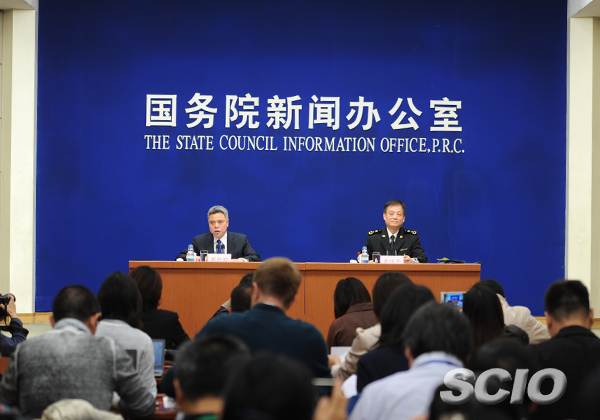China's goods trade 'sound and steady' on rising demand
China's goods trade has had a "sound and steady" performance in the first three quarters of this year, mainly due to rising international demand and a strong Chinese economy.
|
|
|
Huang Songping (R), spokesman of the General Administration of Customs (GAC), speaks at a press conference held by the State Council Information Office in Beijing, capital of China, Oct. 13, 2017. [Photo by Liu Jian/China SCIO] |
China's goods trade volume rose 16.6 percent to 20.29 trillion yuan (3.08 trillion U.S. dollars) in the first three quarters of this year, the General Administration of Customs (GAC) said on Oct. 13.
Exports increased 12.4 percent to 11.16 trillion yuan, while imports surged 22.3 percent to 9.13 trillion yuan, dragging trade surplus down by 17.7 percent to 2.03 trillion yuan.
"China's imports and exports remained sound and steady and witnessed positive changes in the first three quarters," spokesman Huang Songping said at a press conference.
Trade with traditional markets witnessed a full recovery, with exports to the European Union, the United States and Japan up by 16.4 percent, 18.7 percent and 14.9 percent, respectively.
Trade volume for private enterprises also increased, as their combined volume rose 17.8 percent. This accounted for 38.5 percent of the national total, 0.4 percentage point higher than the proportion for the same period of last year.
In September alone, China's foreign trade rose 13.6 percent to 2.46 trillion yuan, with exports up 9 percent and imports up 19.5 percent. Trade surplus shrank 28 percent to 193 billion yuan.
Huang attributed the steady growth in the first nine months mainly to recovery in the world economy, strong economic momentum inside China and rising commodity prices that pushed up both import and export numbers.
World economy has shown more and more signs of warming since the beginning of this year, as the economic situations of major developed economies and emerging markets widely improved.
In its latest World Economic Outlook released Tuesday, the IMF raised its forecasts for world economic growth to 3.6 percent in 2017 and 3.7 percent in 2018, both 0.1 percentage point higher than its forecasts in July.
With a GDP growth of 6.9 percent in the first half, China's economy is also on firmer footing this year, contributing to brisk import growth.
In the first eight months, industrial output growth has accelerated 0.7 percentage point compared with last year. The manufacturing purchasing managers' index for September came in at 52.4, the highest level since May 2012.
The IMF raised its forecast for China growth for the fourth time this year in its latest report, predicting that China's economy will grow 6.8 percent this year and 6.5 percent next year, both 0.1 percentage point higher than its previous forecasts.
Commodity prices also helped, as huge price increases of commodities including crude oil, copper and coal led to a rise of 10.6 percent in import prices and 4.8 percent in export prices.
"The September data add to evidence of robust growth," Bloomberg chief Asia economist Tom Orlik said in a research note.
"2017 is shaping up to be the best year for exports since at least 2013, providing a cushion for China's growth and allowing policymakers to make more progress than expected on tamping down risk to financial stability," Orlik said.
Despite world economic recovery and a strong domestic economy, there are still many uncertainties for China's trade growth in the final quarter, according to Huang.
Rising protectionism, a high base for comparison in the latter half and fierce competition from other countries will all weigh on China's Q4 trade growth, he said.
Nonetheless, "China's trade volume will continue to grow in the final quarter, and may register double-digit growth in the full year," Huang said.
